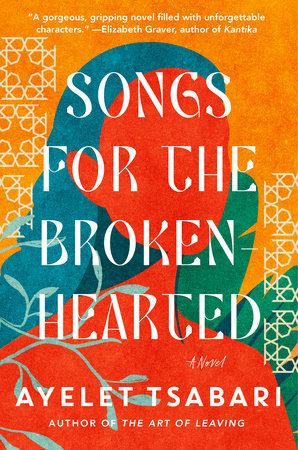Excerpt
Songs for the Brokenhearted
YaqubImmigrant Camp, Mahane Olim Rosh HaAyin, 1950
Years later, when they are old, sitting on a porch somewhere overlooking the sea, someone would ask them how it all started, and he’d say, as soon as he saw her on the other side of the drinking fountain at the immigrant camp, he knew.
The air smelled of citrus, a sweet, tangy scent Yaqub had, until then, associated with Israel because when they got off the planes, it flooded his nostrils. But from that moment on, it was her it evoked. He was washing his hands before dinner. She was scrubbing dishes, using sand in lieu of dish soap, her face round and open, her eyes long lashed and lined with kohl. She was dressed in a buttoned floral dress and a red cardigan—in the camp they were all given used winter clothes that looked nothing like the traditional clothing they had left behind in Yemen. Shoes, too, which they slipped onto their calloused, untrained feet, feet accustomed to cracked earth and soft sand and rugged rocks.
They looked up at the same time and their eyes met. And it was as though his heart stopped. Or he was struck by lightning. Or some other terrible cliché he’d feel embarrassed by as soon as it crossed his lips. He’d try to rewrite it and fail, because, of course, rewriting only works on paper. Still, he’d do his best: he’d gaze up at the sky, eyes squinted in concentration to the delight of their listeners on the porch, and he’d say it was like everyone else vanished from the camp, and all the other smells that permeated the air—sewage and sweat and mildew and rotten garbage—evaporated, and all that was left was the scent of oranges and the two of them, looking at each other over a two-sided, rusty water fountain. She blushed and looked away. Someone behind Yaqub nudged him, urging him to stop hogging the tap, and he walked away from her gaze and her smile. When he looked back, so did she.
“No, I didn’t,” Saida would argue. “I would never.” But this is how he remembered it.
The first time they spoke, she was sitting by the river. He’d tell them of her singing. He’d tell them of the snake. But he wouldn’t tell them she was crying. He wouldn’t mention she confessed she hated all of it. The stench and the crowdedness, the tent with its muddy, slippery ground for a floor, the scratchy blankets and the metal beds, the god-awful food—soggy bread, white oily spread—and never enough of it. She missed her home in the village in North Yemen, the fresh mountain air, the sweet, earthy incense that perfumed their mud houses, strong basil and lemony shadhab; how it was always spring there, never this cold, never this damp. Maybe her Muslim friends were right, and this was a terrible idea. And Yaqub had said, “Don’t say that. This is the place for us. This is the promised land we dreamt about. It will get better. You’ll see.”
He said it like he believed it. Someone had to.
She was a poetess, and he was a storyteller. They both came from Haidan in North Yemen, both orphans, and so young. He was just a boy. She was just a girl. They met at an all-Yemeni immigrant camp in Rosh HaAyin, once a British air force base and now a large tent city, in a new country born of hope and despair, built on the dreams of some and the catastrophe of others, on an ancient land, soaked with blood. All around the country, other camps like theirs were being constructed in haste, one after the other, to accommodate Jewish migrants—hundreds of thousands of them—from Poland, Russia, Bulgaria, Iraq, Iran, Morocco. More were still coming. Some were chased by persecution and fear, others driven by ideology or faith, by messianic zeal, all astounded by the new turn their lives had taken, the future ahead unwritten, so blank it was not even terrifying. Maybe, for some, it was even thrilling.
On the banks of the Yarkon River, she sang (like an angel. No, like bells. No, like clear water drawn from a deep well) and he wrote. And in the midst of all this chaos and uncertainty, at the start of a decade in the middle of a century, they fell in love.
They weren’t supposed to fall in love.
This is how their story began.




